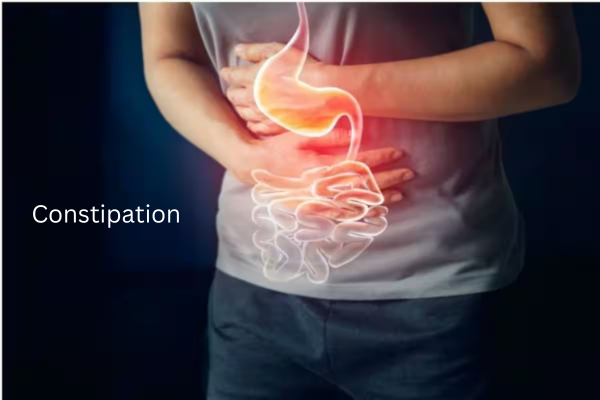Best Remedies and Foods for Constipation Relief
Abstract
Constipation can be painful and lead to health problems. But that happens to a lot of people occasionally, especially when they’re pregnant or taking certain medications. Constipation can have a wide range of possible causes. There are a variety of available treatments. To get rid of intermittent constipation, you might simply need to make a few lifestyle adjustments or turn to natural remedies. Constipation can be a bothersome condition to have. Whole grains, beans, fiber-rich fruits, and a variety of other foods can help relieve and prevent constipation.

Introduction
The condition known as “constipation” describes a person’s diminished bowel movements or trouble passing faeces. Although everyone’s bowel habits differ, constipated adults often have fewer than three bowel movements each week. Constipation is typical. About 16 out of every 100 adults in the United States have constipation-related symptoms. Age increases the risk, and 33 out of 100 people aged 60 and beyond develop constipation.
Symptoms
Constipation can result in more than merely having fewer than three bowel movements each week, as shown by the following signs and symptoms:
- Stools that look like small stones and marbles
- Hard, dry, or lumpy stool
- Pain and discomfort during bowel movements
- Loss of appetite due to a continual sense of fullness
- A sensation of incomplete bowel movement
- A slightly swollen abdomen
Best Foods and Liquids for Ease Constipation
The following may help with constipation relief
Olive and Flaxseed Oil
The mild laxative properties of olive and flaxseed oils facilitate the smooth passage of materials through the intestines. Additionally, the ingredients in these oils have anti-inflammatory, antibacterial, and digestive-improving properties. According to a 2015 randomised controlled trial, flaxseed and olive oils can help people who are receiving hemodialysis, or blood filtering, improve their constipation. Both olive oil and flaxseed oil had similar effects to those of mineral oil, a laxative that doctors occasionally suggest to treat constipation.
Probiotics
Probiotics are good bacteria that may help to strengthen the immune system and soften faeces. Using a thorough analysis of four randomised controlled trials (RCTs), a study was undertaken in 2017 to examine the effectiveness of probiotics as a treatment for constipation in older people. Using probiotics instead of a placebo reduced constipation by 10% to 40%, according to the analysis’s overall findings.
Yogurt and Kefir
Probiotics are present in many dairy products, including yoghurt and kefir. According to a 2017 study by Trusted Source, kefir can help people with physical and mental problems avoid constipation. Each participant consumed 2 grams of “lyophilized” or freeze-dried” kefir per meal for a period of 12 weeks. Constipation was significantly alleviated by kefir, according to the study. While some people did totally heal from constipation, others had no improvement. The scientists came to the conclusion that frequent kefir use could help with constipation prevention.
Sauerkraut
Probiotic bacteria are found in a fermented cabbage meal called sauerkraut, and they may help with constipation and gut health. According to a 2016 study, two tablespoons of homemade sauerkraut have approximately the same number of bacteria as probiotic supplements.
Vegetables and Legumes
Insoluble fibre is abundant in vegetables. This kind of fibre gives stools more volume, which encourages more frequent bowel movements.
Broccoli
Sulforaphane, a compound found in broccoli, may help digestion and protect the gastrointestinal tract. Additionally, sulforaphane may aid in preventing some gut microbes from overgrowing and interfering with normal digestion. In a 2017 study, healthy individuals consumed either 20 g of raw broccoli sprouts or 20 g of raw alfalfa sprouts daily for four weeks. Researchers discovered that those who consumed broccoli sprouts experienced fewer constipation symptoms and speedier bowel movements.
Pulses
The majority of legumes, including peas and lentils, are particularly high in fibre. According to a 2017 study by Trusted Source, 100 g of cooked pulses provide about 26% of the daily recommended fibre intake in the United States. A 100 gram serving of pulses contains considerable levels of the following additional nutrients, which relieve constipation
- Folate
- Zinc
- Potassium
- Vitamin B6
Fruits
Fruits have a high water content and a lot of insoluble fibre. Fruits are therefore particularly useful for reducing constipation. The fruits listed below can be used to treat symptoms. Fruits with a high fibre content that could treat constipation include
Kiwifruit
100 grams of kiwifruit typically contains 3 grams of trusted source of fibre. Additionally, kiwifruit includes the enzyme actinidine, which reduces upper gastrointestinal symptoms like
- Abdominal discomfort
- Pain
- Reflux
- Indigestion
Apples and Pears
The high water content in these fruits might aid in digestion and avoid constipation. A person should consume apples and pears uncooked, whole, and with the skin on in order to maximise their nutritional value. These fruits include a number of substances that enhance digestion, such as
- Sorbitol
- Fibre
- Fructose
Grapes
These fruits are high in fibre and have a lot of skin compared to flesh. Additionally, they have a lot of water, which helps soften firm stools.
Blackberries and Raspberries
These fruits’ high fibre and water content can help with constipation. One can attempt to consume one or two handfuls of raw, cleaned blackberries or raspberries each day.
Prunes
Prunes are high in fibre, but they also have sorbitol and phenolic chemicals, which may be good for the digestive system. Prunes’ impact on the degree of constipation in women 60 and older was looked into in a 2018 study. The researchers divided the 60 participants into two groups, each with 30 participants. Both teams kept eating their regular lunches. However, for three weeks, the treatment group ate 50 g of rehydrated prunes every morning. The treatment group demonstrated a significant reduction in the severity of constipation symptoms as compared to the control group. At the conclusion of the first week, these changes started, and they persisted into the third. Prunes may be a beneficial adjunct therapy for easing the severity of constipation in older women, the authors concluded.
Whole Wheat Bread, Cereals, and Pasta
Products made from whole wheat are a great source of insoluble fibre. Whole wheat products should be consumed raw or hardly cooked if one wants to receive the most nutrients from them.
Whole Bran
Wheat bran is the term for the hard outer layer of the wheat kernel. It has a lot of insoluble fibre. A 2017 study examined the effectiveness of wheat bran as a constipation treatment for infants and older children. Researchers spent seven months researching 51 children. Researchers discovered a strong correlation between increasing bran intake and better bowel motions during this time. By the end of the trial, 86% of the children had improved bowel habits.
Liquids
Stools become softer and simpler to pass when liquids are added, adding moisture. The liquids listed below can be used to treat constipation.
Water
Constipation is frequently brought on by dehydration. Dehydration impairs a person’s ability for their intestines to generate water-filled faeces. Dehydration causes hard, dry, and lumpy stools that are difficult to pass. Drinking a lot of water can help alleviate or eliminate the symptoms and prevent constipation.
Clear Soup
Since warm beverages and foods are typically simpler to digest, clear soups may be particularly useful for alleviating constipation.
Best Remedies for Ease of Constipation
For treating constipation, certain Indian medicines work better than others. In this article, we’ll examine some of the well-known Indian treatments for constipation, as well as the science behind them and how you might use them at home.
Ginger
When compared to a control group that took a placebo, people who took 100 milligrammes of ginger extract had more bowel movements, according to a 2015 analysis of clinical trials. Additional constipation-related symptoms, including nausea, cramping, and bloating, may also be managed with the aid of ginger. Generally speaking, ginger is considered safe for children, pregnant women, and nursing moms. In fact, ginger is recommended for pregnant women who have nausea and constipation.
How to Use It
To treat constipation, slice raw ginger root into pieces and chew it slowly. Try making some ginger tea or simply letting some ginger steep in hot water if the flavour doesn’t sit well with you.
Triphala
Bibhitaki, Haritaki, and Indian gooseberry are all components of the herbal treatment triphala. Triphala functions as a moderate laxative in addition to having anti-inflammatory and antioxidant qualities. Even tiny doses of triphala taken orally can aid in weight loss and guard against digestive malignancies. Triphala should not be taken by minors, women who are pregnant, or nursing mothers.
Ghee and Milk
Clarified butter, commonly known as ghee. Some individuals swear by mixing ghee with warm milk or water and consuming it right before bed to treat constipation problems. Few studies support the use of cow ghee and milk to relieve constipation. Dairy products frequently make intestinal obstructions and gastrointestinal discomfort symptoms like cramps worse. The majority of the data supporting the use of ghee in milk for constipation is anecdotal.
How to Use It
It would be worthwhile to try combining a spoonful of ghee with a small cup of warm milk before bed if you are not allergic to dairy.
Senna Tea
Senna tea is a herbal blend produced from the blooms of plants related to legumes. Senna plants are grown all over the world, but an exclusive kind is developed in India for its therapeutic benefits. Sennosides, which are found in senna leaves, can irritate your digestive system just enough to prompt a bowel movement. You should not use senna if you are pregnant, nursing, using blood thinners, or taking steroids right now. Senna should only be used as a temporary fix for constipation because prolonged use can harm your digestive system.
Lemon Water
Lemons are rich sources of water-soluble fibre and vitamin C. Additionally, citrus occasionally stimulates the intestines. Since constipation can be an issue, some people may use warm lemon water to help things go along. Anyone who is old enough to drink diluted lemon juice, including pregnant women and nursing mothers, can use this cure without risk.
How to Use It
Simply squeeze some fresh lemon juice into some lukewarm water and sip it slowly, especially in the morning, to try this cure. Additionally, to help with constipation, try to drink plenty of ordinary water throughout the day.
Other Natural Remedies for Constipation
There are numerous alternative at-home treatments for constipation. These treatments can be used in conjunction with more conventional Ayurvedic ones, or you can experiment slowly until you find something that works for you. Here are some recommendations
- Drink plenty of water.
- Yoga session using poses for constipation relief
- Eat fiber-rich food.
- Try other light exercises or go for a jog.
Conclusion
Constipation can be painful and lead to health problems. But that happens to a lot of people occasionally, especially when they’re pregnant or taking certain medications. Constipation can have a wide range of possible causes. There are a variety of available treatments. Age increases the risk, and 33 out of 100 people aged 60 and beyond develop constipation. For treating constipation, certain Indian medicines work better than others. In this article, we examined some of the well-known Indian treatments for constipation, as well as the science behind them and how you might use them at home.





